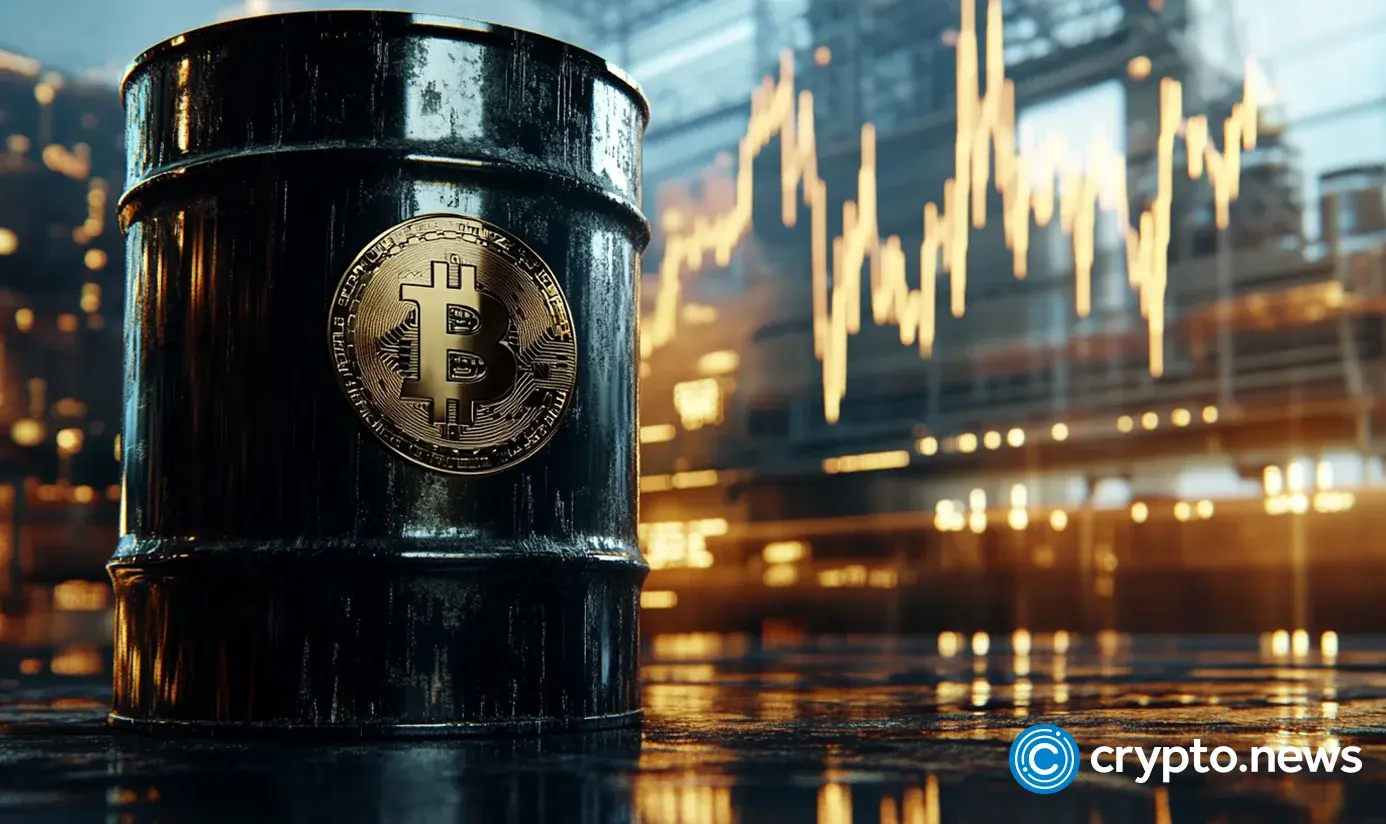Disclosure: The views and opinions expressed right here belong solely to the writer and don’t symbolize the views and opinions of crypto.information’ editorial.
Regardless of ostensibly being very totally different belongings, Bitcoin (BTC) and oil share quite a bit in widespread. They’re each commodities, for one factor, and are famously laborious to extract. Vital work is required to acquire them by mining and drilling, respectively. In addition they lie on the bedrock of world industries: oil as the premise for manufacturing and power manufacturing; Bitcoin because the spine of digital asset creation and onchain liquidity. You possibly can construct cool stuff utilizing the uncooked supplies which are Bitcoin and oil, from permissionless lending merchandise to youngsters’s toys.
Abstract
- The Bitcoin–oil fusion: Tokenizing oil futures and backing them with Bitcoin as collateral might create censorship-resistant artificial commodities that merge real-world utility with digital liquidity.
- BTC serves as collateral for tokenized oil contracts, enabling world, permissionless buying and selling past conventional banking rails — significantly interesting for nations or entities restricted from the greenback system.
- Regardless of regulatory challenges, BTC-backed oil might pioneer a brand new class of programmable, onchain commodities — unlocking liquidity, enabling fractional participation, and redefining how world markets worth and commerce power.
What would occur, then, should you have been to mix the 2? Tokenizing oil and backing it with Bitcoin as collateral may sound like a madcap concept the primary time you hear it floated. However whenever you dive a bit of deeper, it’s not almost as harebrained because it sounds. The truth is, there’s a compelling case for doing so to create a brand new class of artificial, censorship-resistant commodities.
The case for combining commodities
Within the final two years, the rise of tokenized real-world belongings has seen all the things from gold to shares positioned onchain, enabling them to be traded, borrowed in opposition to, and fractionalized 24/7. Oil has not been exempt from this revolution, which has elevated RWAs right into a $28 billion sector. After all, it’s one factor to have the ability to commerce a token pegged to the value of a barrel of crude; fairly one other to tokenize the complete oil futures market with bitcoin serving as collateral.
How would it not work precisely? What would the advantages be? And simply as importantly, who would profit?
The thought of tokenizing oil futures utilizing Bitcoin as collateral has been circulating for some time, but it surely’s now beginning to be taken significantly. The infrastructure for asset tokenization, issuance, and buying and selling is all in place, whereas BTC is quickly turning into the popular collateral for backing all the things from stablecoins to lending markets. Its liquidity, suitability as a retailer of worth, and relatively low volatility make it the apparent alternative for backing nearly any sort of tokenized asset — oil included. However what would such a commodity combo appear like in observe?
Bodily oil meets digital gold
Oil futures are already a thriving market, enabling speculators and producers alike to enter into contracts that compel them to purchase or promote oil at a future date. These contracts, often denominated in a measurement of 1,000 barrels of WTI, will commerce for $65,000 every if the value is $65 a barrel. Naturally, the value of a barrel of oil fluctuates with world provide, demand, and the standard geopolitical occasions.
Changing oil futures contracts — agreements to purchase or promote oil at a predetermined worth on a future date — into blockchain-based tokens is comparatively easy. Including Bitcoin into the combo, nonetheless, provides one other dimension. As a result of Bitcoin is apolitical and past the management of any single nation, it’s to all intents and functions an agnostic technique of fee and unit of account.
Everybody can entry BTC, and nobody can limit it: the Bitcoin ledger is past the purview of companies resembling OFAC that dictate the international locations and counterparties that may commerce. That is significantly beneficial when coping with oil, a useful resource that comes from a few of the most controversial and financially blacklisted international locations on this planet. It’s inconceivable to keep away from politics when coping with oil, which is why Bitcoin could possibly be the best forex for oiling the rails required to entry it.
Such an instrument would seemingly enchantment to nations sidelined from the worldwide monetary system, resembling these excluded from SWIFT or beneath sanctions. The flexibility to commerce power commodities with out counting on conventional banking rails is a gorgeous proposition. And given the dominance of such nations in oil manufacturing, that is primary widespread sense: we don’t apply network-enforced sanctions to BTC transactions. Why ought to we do the identical for oil, an important useful resource that’s each bit as world and one of many uncooked supplies of the worldwide economic system?
Who’s gonna construct it?
Whereas BTC’s potential to ease fee flows, serving as a censorship-resistant and liquid unit of account, is unequalled, there are some potential sticking factors with bitcoin-backed oil futures. The obvious query is who can be prepared to construct such a platform. U.S. firms are mechanically out of the query, since a willingness to do enterprise with sanctions-hit international locations would immediately land them in sizzling water.
After all, they may simply vet all customers — as RWA platforms at the moment do — so as to meter entry, however that sort of defeats the purpose of backing it with a world, censorship-resistant cryptocurrency; may as effectively use USD Coin (USDC). The answer to this deadlock can be to create a permissionless, decentralized protocol that anybody can entry, forming a common system for buying and selling oil futures. The advantages of such a protocol prolong far past speculating on the value of WTI: utilizing the composability that’s DeFi’s stock-in-trade, a wealth of monetary merchandise could possibly be constructed upon this highly effective primitive.
Extra than simply oil
By mixing the liquidity of crypto with the soundness of bodily commodities, BTC-backed oil might pioneer artificial belongings that resist censorship, enabling programmable, borderless finance in a unstable world. For example, tokenized oil might function collateral in decentralized finance protocols, permitting traders to generate yield or bundle it into multi-asset portfolios. It could possibly be borrowed in opposition to and used to subject yield-bearing stablecoins, enhancing capital effectivity.
If scaled efficiently, this might start a completely new class of belongings: artificial commodities that mix the shortage of Bitcoin with the real-world utility of oil, providing resilience in opposition to geopolitical disruptions and regulatory overreach. And since tokenization permits fractionalization, you wouldn’t want a $65,000 contract to take part — $100 would do, remodeling oil right into a globally tradable commodity.
Traders would put up BTC as collateral to open or keep positions in tokenized oil futures, utilizing the identical formulation that allows onchain margin buying and selling. Bitcoin’s volatility can be mitigated by over-collateralization and automatic liquidations, guaranteeing positions stay solvent. And naturally, good contracts would automate the complete lifecycle, from collateral administration and margin calls to settlement. Lastly, integration with DeFi would permit for utilizing tokenized oil as collateral for loans or yield farming, making a programmable monetary ecosystem that operates 24/7.
The bull case for Bitcoin-backed oil
One of many main advantages of RWA tokenization is that it democratizes entry to illiquid commodities, permitting immediate transfers and fractional buying and selling. This might unlock billions in trapped capital, with blockchain enabling near-instant settlements, decreasing the delays in conventional markets, and eliminating geographic limitations. Combining power markets with blockchain liquidity would offer a world window into the temper of the markets — and thus the world — across the clock.
Coupled with the flexibility for tokenized oil to turn out to be “good” collateral, integrable into DeFi for yield technology, lending, or commodity baskets, and the upside to bitcoin-backed oil is clear. The creation of such an answer — or competing options — would do extra to speed up RWA tokenization and capital inflows than that of some other asset class.
The catch, after all, and it’s an enormous one, is that regulators in varied jurisdictions — the U.S. mainly — would take a dim view of their residents buying and selling such a protocol, understanding that the counterparty could possibly be Russia or Iran or umpteen different international locations which were squeezed out of the dollar-denominated world banking system. Which is why, if such an answer does floor, it’s prone to be developed by considered one of these marginalized nations.
The demand is there
A permissionless and globally accessible oil futures market backed by BTC appears to be like unlikely to materialize any time quickly. However it may be claimed with confidence that the demand for such a product exists, not simply amongst international locations on the naughty listing, however amongst merchants, DeFi natives, hedge funds, and oil producers the world over. As a result of there’s already loads of proof testifying to the piecemeal efforts being made to engineer options that mix oil with blockchain expertise.
Some Russian firms are already utilizing BTC for oil buying and selling, whereas oil and gasoline offers are at the moment being tokenized in areas resembling Latin America. Crypto merchants in areas together with the U.S. can at the moment commerce oil futures on regulated exchanges resembling Coinbase Derivatives, whereas the thought of making oil-backed cryptocurrencies has been producing dialogue — albeit with restricted supply — for years.
BTC-backed oil futures should not a radical concept. The truth is, there’s a powerful case for saying that it’s an concept whose time has come. Pure assets are by their nature unconstrained by borders and arbitrary legal guidelines: they exist in pockets all around the globe, and they’re relied on by all world residents, both straight or not directly. And of all such assets, oil is on the high of that listing.
Greater than some other commodity, the value of oil is deeply correlated with macro occasions, from financial efficiency to geopolitical battle. The flexibility for anybody to commerce the identical tokenized oil futures — permissionless, censorship-resistant, and absolutely clear — would type the last word sentiment indicator, with artificial commodities and non-debasable digital forex forming the foundations of a brand new monetary system.






